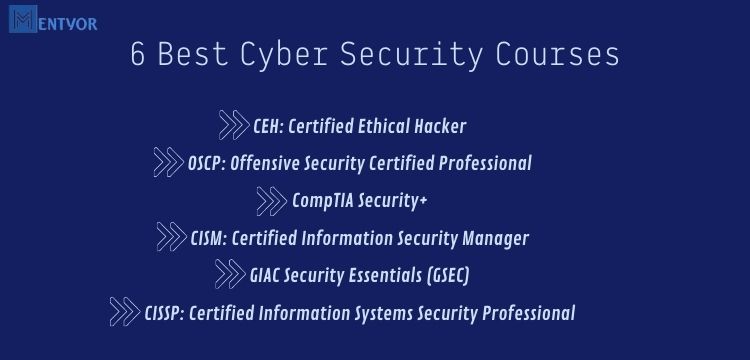The market for cybersecurity is expected to rise by 33% between 2020 and 2030, making it an area that is expanding quickly. Given that the average for other industries is 8%, it is quite a bit! And it’s not surprising given the growth in data breaches, which includes government hackers looking for crucial data.
Without a question, in the current business climate, when businesses are exposed to a high risk of malware, other types of software infections, and online dangers, information security and cyber security are crucial.
While you should ideally enroll in a computer science degree programme or other recognised course where you may tailor networking and security content to your career path, there are other possibilities you can explore to determine whether the field is right for you. Like which are the Best Cyber Security Courses, know more about it.
You must enroll in more difficult courses if you wish to work as a professional in your field.
Even yet, some of the free providers provide premium courses that are frequently less expensive than undergraduate education and may enable not just the right instruction but also the ties to the business that will help you on your journey.
Here we have a list of critically acclaimed cybersecurity certification courses that are popular and will help you scale the walls of cybersecurity in today’s market.
Read about Top University to study Cybersecurity: 5 Top Universities for Cybersecurity to study in 2022
6 Best Cyber Security Courses

CEH: Certified Ethical Hacker
The International Council of E-Commerce Consultants offers an intermediate certification called CEH (ANSI) (EC-Council). IT workers who want to work in white hat hacking need this certification, which attests to their proficiency in the five stages of ethical hacking: reconnaissance, enumeration, acquiring access, access maintenance, and trace covering.
Candidates must pass one test in order to get a CEH (ANSI) certification. It is advised to take a thorough five-day CEH training course, with the exam being given at the end of the programme. Although candidates may self-study for the test, they must provide proof of at least two years of information security job experience with employer verification. Candidates who choose to self-study must additionally submit an extra $100 application fee.
Experience can be replaced with education, but this is determined on a case-by-case basis.
For each three-year cycle, holders of the CEH certificate must complete 120 hours of continuing education because the technology used in hacking evolves practically daily.
There are many additional options for self-study resources available to IT workers, including video training, practice examinations, and books, despite the fact that EC-Council offers both instructor-led and online instruction for its CEH certification.
OSCP: Offensive Security Certified Professional
Penetration testing requires the Offensive Security Certified Professional (OSCP) certification. It is the first practical offensive Information Security certification programme available to individuals. By using this certification, the person will be able to communicate and show that they understand the basics of penetration ideas and can navigate their life cycle.
The OSCP test, which is intended for experts in the field of information security, is regarded as an advanced certification. If they do not already have a few years of expertise in the business, cybersecurity newcomers may find it difficult to study for the test.
You must first pass the “Offensive Security Certified Expert (OSCE)” training programme before you can receive the OSCP certification. You will learn the abilities required to pass the OSCP test in this course.
More than 17 hours of video make up the PEN-200 e-learning course’s supplemental material.
Additionally, candidates must spend a lot of time practicing on any retired OCSP test computers that are still accessible.
The OSCP test is renowned for being challenging. Candidates must complete a 24-hour exam that requires them to break into and attack live equipment in a secure lab setting. They must then produce a thorough penetration test report as well.
Costs for self-study materials vary depending on how long of access is required, from $999 to $5,499.
CompTIA Security+

CompTIA’s Security+ is a well-respected, vendor-neutral security certification. Holders of the Security+ certificate are known for their outstanding technical proficiency, depth of knowledge, and competence across a variety of security-related fields.
The best applicants have at least two years of experience working in network security, even though Security+ is an entry-level certification. They should think about first earning the Network+ certification. Achieving this certification demonstrates an IT professional’s proficiency in security systems, threat management, cryptography, identity management, network access control, and security infrastructure.
A single exam for the Security+ certification is necessary, and it costs $381 right now. Training is offered but not necessary.
Prior to January 1, 2011, IT workers who acquired the Security+ certification kept their credentials forever. After that date, certification must be renewed every three years in order to be valid. Prior to the end of the three-year period, applicants must complete the CertMaster CE online course or earn 50 continuing education units (CEUs) in order to renew.
Read about reasons to get Cybersecurity Degree in 2022: Top reasons to get Cybersecurity degree in 2022
CISM: Certified Information Security Manager
For IT professionals who are in charge of managing, creating, and directing information security systems in enterprise-level applications or creating organizational security best practices, the CISM certification is a top credential. The
created the CISM accreditation to security professionals in 2003. .
The CISM certificate caters to the requirements of IT security experts who are responsible for enterprise-level security management. Holders of credentials have advanced and established expertise in governance, programme creation and management, incident management, and response.
The CISM credential, which is intended for seasoned security professionals, requires applicants to submit a written application, agree to the ISACA code of ethics, pass a thorough exam, have at least five years of experience in information security management, and follow the organization’s continuing education policy. For the whole experience requirement, there are certain combinations of education and experience that may be replaced.
Holders of the CISM certificate must pay a yearly maintenance fee of $45 (ISACA members) or $85 (non-members) for the credential, which is valid for three years (non members). A minimum of 120 continuing professional education (CPE) credits must be earned by credential holders over a three-year period in order to maintain their credentials. Every year, at least 20 CPE credits must be obtained.
GIAC Security Essentials (GSEC)
Global Information Assurance Certification (GIAC) certifications are trusted by thousands of companies and organizations, including the US National Security Agency (NSA).
Cybersecurity certificates are offered by GIAC in a number of disciplines, including forensics, incident response, penetration testing, and cyber defense.
GSEC is the entry-level certification from the Global Information Assurance Certification (GIAC)
Verifying a person’s practical experience is the GSEC’s goal. There are no explicit pre-requisites for the GSEC. However, those interested in taking the test should have a fundamental knowledge of networking and IT security.
Your understanding of active defense, network security, encryption, incident response, and cloud security is confirmed by this cybersecurity certification.
Up to 180 questions are on the 4-5 hour test, and a passing mark of 73 percent is required. Various formats for training are offered. The cost of the exam, which includes two practice exams, is $949 as of 2022.
Those with GSEC credentials may anticipate to earn, on average, wages ranging from $67,000 to $108,000 per year, albeit it relies on criteria including job title, years of experience, and region.
Read more about Cybersecurity Courses: Cybersecurity Career – Courses, Subjects, Entrance exams
CISSP: Certified Information Systems Security Professional

For IT professionals who are serious about careers in information security, the CISSP is an advanced-level certification. This vendor-neutral certificate is provided by the International Information Systems Security Certification Consortium, or (ISC)2, and is noted for its high standards of excellence.
The CISSP certification is still in great demand among IT specialists and is highly respected by IT firms. It frequently appears on lists of essential and most-wanted security certifications.
The CISSP is intended for seasoned security experts. For this certification, you must have either four years of experience in at least two (ISC)2 Common Body of Knowledge domains plus a college degree or another recognised credential, or at least five years of experience in at least two of (ISC)2‘s eight common body of knowledge (CBK) domains.
The CBK domains include identity and access management, asset security, communications and network security, security architecture and engineering, security operations, security assessment and testing, and security security for software development.
Additionally, (ISC)2 has three CISSP specializations that concentrate on certain IT security interests:
- Engineering (CISSP-ISSEP),
- Architecture (CISSP-ISSAP),
- Management (CISSP-ISSMP)
Candidates for the certificate must already hold a current, valid CISSP. Each CISSP concentration test costs $599.
The CISSP credential maintenance cost is $125 per year. It is necessary to recertify every three years. Candidates must get 40 CPE credits annually, for a total of 120 CPE credits throughout the course of the three-year cycle, in order to recertify.
Conclusion
Thus in this article we have shown you the best certification courses that are trending in 2022. These certifications are an industry standard and help formalize your position as a cybersecurity professional and add more credibility to it.
These certifications are mostly paid and require to be renewed after a certain period of time, owing to the dynamic nature of the cybersecurity field. They are mostly inexpensive and are an annual or triennial fee that helps you maintain your identity as a cybersecurity certified professional.
FAQs
- Which cybersecurity certification is best?
The list of following certifications are best for cybersecurity professionals:
- OSCP: Offensive Security Certified Professional
- CEH: Certified Ethical Hacker
- CompTIA Security+
- GIAC Security Essentials (GSEC)
- CISM: Certified Information Security Manager
- CISSP: Certified Information Systems Security Professional
- Is GSEC an entry level certification?
GSEC is an entry-level certification from the Global Information Assurance Certification (GIAC)
GSEC’s ultimate goal is to verify a person’s practical experience. There are no explicit pre-requisites for the GSEC. However, those interested in taking the test should have a fundamental knowledge of networking and IT security.
- Which is better: CEH or Security+?
CEH or CompTIA Security+? With either of these qualifications, you cannot go wrong. You will be able to excel in the world of cybersecurity with any of these credentials. If you are completely new to the field of cybersecurity, you might want to consider pursuing the CompTIA Security+ certification.
- Is OSCP certification hard to pass?
The OSCP test is renowned for being challenging. Candidates must complete a 24-hour exam that requires them to break into and attack live equipment in a secure lab setting. They must then produce a thorough penetration test report as well.
Additionally, candidates must spend a lot of time practicing on any retired OCSP test computers that are still accessible.
- How much does CISSP certification cost?
Candidates for the certificate must already hold a current, valid CISSP. Each CISSP concentration test costs $599.
The CISSP credential maintenance cost is $125 per year. It is necessary to recertify every three years.


 WhatsApp
WhatsApp